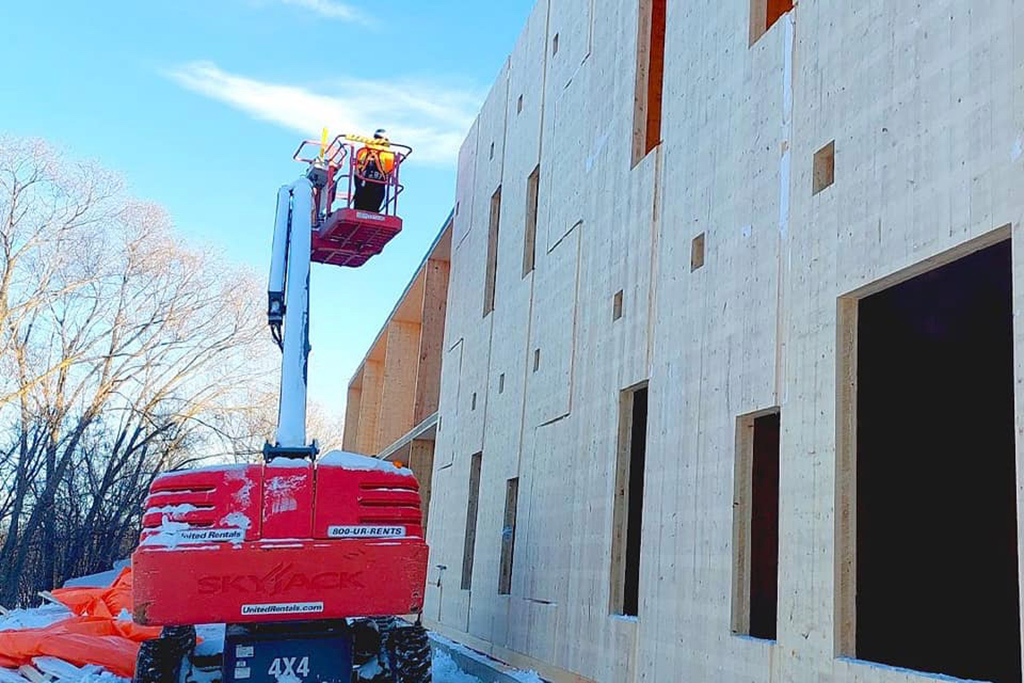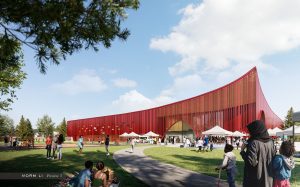When the shovels go into the ground for three cross-laminated timber (CLT) buildings in West Toronto later this year or early 2023, it will mark a condo construction first for the city and raise the profile of CLT in Ontario.
Windmill Developments and Leader Lane Developments are partners in the main-street project where the 83 units will be the city’s first CLT condos, spread between three sites and anchored by the Mimico GO Train Station.
The buildings, targeting LEED Platinum certification and following One Planet Living principles for environmental and social sustainability, will have R-Hauz serving as design-build contractor.
CLT is an engineered wood product created by gluing together several layers of kiln-dried lumber laid flat-wise. Panels typically have three to nine alternating layers of dimension lumber and thus have a high strength-to-weight ratio, as well as superior structural, thermal, fire and acoustic performance, according to the Canadian Wood Council.
Because CLT buildings are prefabricated off-site, embodied carbon is significantly reduced for the structure. Other benefits include reduced construction timelines, less construction waste and fewer overall carbon emissions.
“CLT is getting more traction and something we’ve been following,” says Jonathan Westeinde, CEO of Windmill.
Westeinde says Windmill has had conversations with a lot of groups about bringing CLT solutions to the market, but R-Hauz founder-developer Leith Moore had worked through many of the challenges involved, developed a prefab solution and completed a 26,000-square-foot pilot project that includes two five-plexes on Toronto’s Queen Street East.
Westeinde says R-Hauz was looking for a long-term partnership such as this to create missing middle housing. While Toronto has a policy that encourages six to eight-storey projects, few builders construct them because approval times can be lengthy and smaller, one-off projects often aren’t financially viable.
Because the R-Hauz design is repeatable, approvals don’t have to start from scratch for every project.
“Our three sites need slight minor variances, but Leith has worked with the city and that will allow fast-tracking of what we’re doing,” says Westeinde.
R-Hauz’s six-storey pilot project on Toronto’s Queen Street East was Ontario’s first all-wood, mass-timber residential building with multiple units.
Its prefabricated panels were built off-site at Element 5 Co.’s St. Thomas, Ont. plant then assembled on location.
The pilot used mass timber sourced from Austria; subsequent projects will use Ontario wood.
One of the biggest hurdles in getting the pilot project approved was the wooden elevator shaft and staircase, not permitted under the Ontario Building Code. The building code barriers were overcome by using a non-combustible covering over the wooden stairs.
Windmill and Leader Lane’s three sites are within 250 metres of each other, with the plan to create a cluster that will form one community, says Westeinde.
The buildings will be constructed one site at a time. As soon as one is sold and built, the next will progress.
Westeinde says construction will start in December or February, with residents moving in eight to 12 months later.
As for CLT construction costs, they are similar to traditional construction costs, says Westeinde. The savings are not in the capital costs, but in time-saving.
He expects timeframes to be shorter as more projects get built. The crews will be doing this type of build for the first time and there will be a training/learning curve.
The developers are currently working with R-Hauz to finalize designs. Unlike R-Hauz’s pilot project where the units were rentals and uniform in size, these will range from bachelor to three-bedroom suites and have a higher level of finishes.
Windmill is an Ottawa company founded in 2003 by Westeinde and a like-minded group who believed the development industry could make a difference in the fight against climate change. The company follows the One Planet Living framework of 10 principles to achieve sustainability in all its projects.
Some other Windmill projects include The Plant (with Curated Properties), an award-winning 10-storey mixed-use condo on Toronto’s West Queen West, with urban agriculture amenities, and Zibi, a 34-acre, mixed-use master-planned waterfront community in Ottawa and Gatineau that aims to be Canada’s most sustainable neighbourhood. Its zero-carbon District Energy System will use post-industrial waste energy for heating and the Ottawa River for cooling.
Leader Lane Developments is a multi-disciplinary firm with a depth of project experience.
As part of the joint venture partnership, all three CLT properties will receive funding from the One Planet Living (OPL) Fund, developed by Windmill Development in partnership with Epic Investment Services. It’s the first private Canadian mixed-use opportunistic real estate development impact fund designed to accelerate the implementation of impact investing principles in real estate while generating market returns for investors. The OPL will be contributing to a billion-dollar pipeline of projects in Ontario and Quebec designed to popularize and proliferate the One Planet Living framework.











Recent Comments
comments for this post are closed